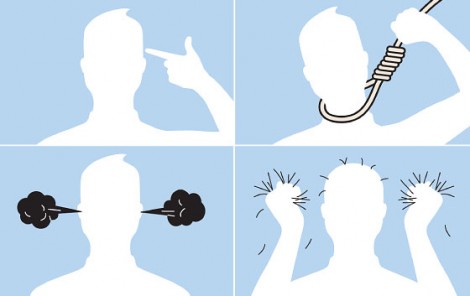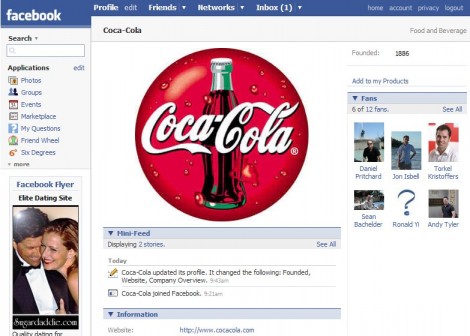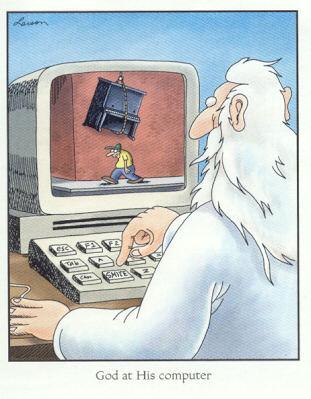Ms. Jones took a break from reviewing movies to totally read my mind.
She has written one of the best lines ever, IMHO: "I hate [Facebook] without understanding it, like a dog barking at a vacuum cleaner."
Admittedly, I'm on Facebook because I succumbed to peer pressure, too. I look at it maybe once every two months, and I still don't get it. Just like I get Twitter even less. Call me old fashioned, but back in my day, we used to write e-mails and blog. You youngin's with your Walls and thousands of friends just can't understand.
To Jones's credit, she didn't say anything about our increasingly atomized, bowling-alone society which beckons pseudo-social networks like Facebook to step in and fill the yawning void of our lonliness and disconnectedness. Thankfully she left that for me to point out and feel smart.

Maybe somebody could explain Facebook to me. I'm on it and I still don't get it. I hate it without understanding it, like a dog barking at a vacuum cleaner.
Facebook's in the news for violating people's privacy and selling off their information, for general malfeasance and sleaze, the usual stuff. Boycotts are called for. It's made me wonder: is something as apparently rotten as Facebook worth the trouble of boycotting? If you're misguided enough to join Facebook in the first place, don't you deserve everything you get?
[By the way, there have been gobs of articles lately about how Facebook founder, wunderkind, and CEO Mark Zuckerberg is a total prick who cares nothing about our privacy, or people in general. - J]
Let me just say in my own defense, I never intended to be on it. As soon as I heard about it, I sensed it was sinister. "What's it good for?" I'd ask, and the eager Facebook shill would say, "It lets people find you, people you used to know."
"Holy God," I'd say. "I'd pay to make that not happen."
For years, I maintained a semblance of human dignity. But the nagging got so intense, I finally succumbed to peer pressure about six months ago. I set up my Facebook "profile," which was no sweat. Nothing but name, rank, and serial number, that's all you ever give up. As for a photo of me, well, I laughed at the very idea. A photo of somebody could go up there, as long as it wasn't me. Morticia Addams, maybe?
Lots of people hailed me right away, wanting to be "friends." Some of them I actually knew, and didn't hate, so there was a brief interlude that was practically heartwarming. Jolly greetings ("Eileen!! How ARE you?!") and all that. So that was okay.
But I was immediately disturbed about the whole "wall" phenomenon. See, people who are your "friends" write short messages, and any replies from their "friends" also show up, and pretty soon you've got streams of communiqués, many from "friends of friends," aka total strangers, messing up your "wall." For sheer randomness, it's like reading the graffiti in a public toilet, only minus all the interest, because public-toilet-writing generally involves the thrill of anonymous venting, heavy on the obscenities.
On Facebook, nobody vents at all. Nobody even swears. They used to, apparently. During its first phase, as millions of tiresome gasbags will tell you, Facebook was the site for stupid college kids to revile their professors and employers and describe their embarrassing sex lives and post pictures of themselves drunk. Then professors and employers starting reading Facebook, and the feds went after the Einsteins who posted their "Should Obama Be Killed?" poll, and the party was over.
Which meant Facebook was safe for the oldsters. Oldsters are more cagy but still fundamentally stupid. They persist in providing absurdly generous "profile" information about themselves, throwing their identities open to the world, but they're all carefully pretending to be nice and upbeat and not-crazy. Look, I'm all for strangers being nice in public; hell, I'm in favor of bringing back dueling, just to guarantee that everybody thinks twice before being impolite to others on the street. But I don't want to go to a special site for blasts of can-do perkiness ("I had a great day today yodeling in the Swiss Alps!") or random endorsements ("Evelyn is a fan of STP Motor Oil").
The whole point of having friends, as opposed to "friends," is that you don't have to relentlessly keep up appearances and strike poses. You can get out of the public eye and relax and curse and rant and glower and generally express yourself. So I didn't understand the point of Facebook. Pretty soon I was only using it to send private messages to actual friends, and what's the point of that? I already knew e-mail was a great invention.
The queasy blend of friends and "friends" is central to the Facebook experience. People who might get some sane use out of Facebook are advertising something, a business or a service or something. Facebook might have originated as a means of personal connection, but now it seems like strictly business disguised as personal connection, and the rhetoric of it is just as horrible as that sounds. Everybody writes in ad-sized bits, everybody "likes" a million products and services, everybody affirms things and exclaims over things like TV pitchmen. It's as if everyone you know is turning into those horrible shills who blog about things they pretend to like for company kickbacks.
(You might say that's nothing, so what—pretending to like something for cash is no big deal. But if so, you're already a goner. What you like and dislike is fundamental, and if you've lost touch with that, you're a pod-person. Ask Ralph Waldo Emerson, who said the pressure to conform in America is so intense that most adults can't even articulate to themselves what their true preferences are, and that almost no one lives as a free human being but the occasional small boy, who will fearlessly declare the desires of his soul and body, and damn the consequence.)

After a few tentative attempts at posting on Facebook, I retreated into horrified silence. I couldn't do the lingo. Then I decided not to try to do the lingo. It's kind of like advertising for yourself, if your self was a plastic novelty toy: lots of cute photos and "hurray for everything" patter. I can only stand to look at it once a week. But I can't seem to cut ties, no matter how obviously I should. I mean, many friends are on there, posting like mad, poor sods! Plus there's a terrible fascination about Facebook: it's so godawful, but so generally embraced. It made me start to believe there really is such a thing as "postmodernity," and that most people have cheerfully given up the idea of having an authentic self. Happy artificial constructs! Meanwhile I'm a leftover modern type, still hanging back in the era of alienation, clinging to my likes and dislikes, occasionally fretting about the death of God.

Speaking of the death of God, I went to a graduation ceremony the other day, where the keynote speaker was a celebrated sound editor on many famous films. He did a PowerPoint presentation, heavy on the cornball humor that plays so well at graduations, showing the students that they are all "iGrad" units who need to upload the "experience app" and prepare for the world by self-branding, getting a logo, marketing themselves as product. "Because you ARE all products," he said encouragingly. "Universities are in the business of PRODUCING graduates, in the hopes that you will all become PRODUCTIVE in the world." The kids ate it up, and the profs smiled, and the parents applauded enthusiastically.
Way in the back, I broke out in a cold sweat.
No comments:
Post a Comment